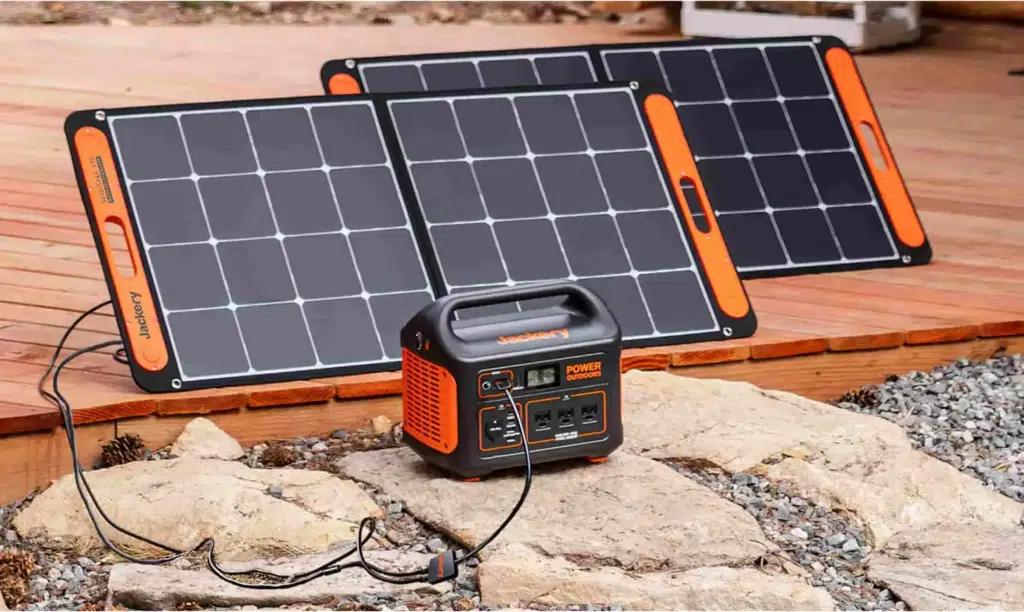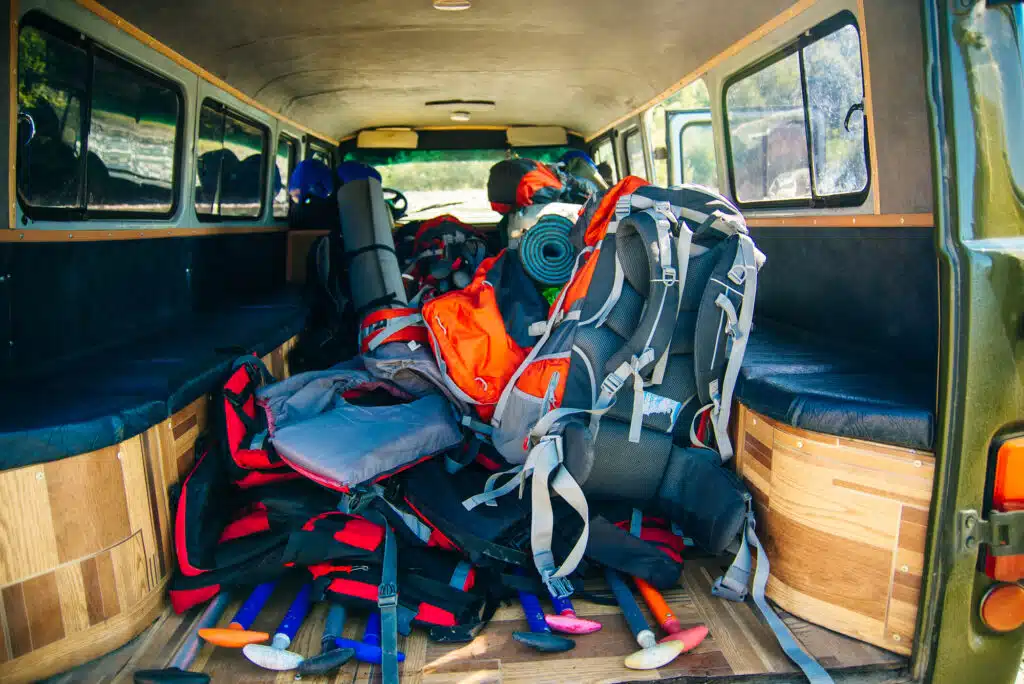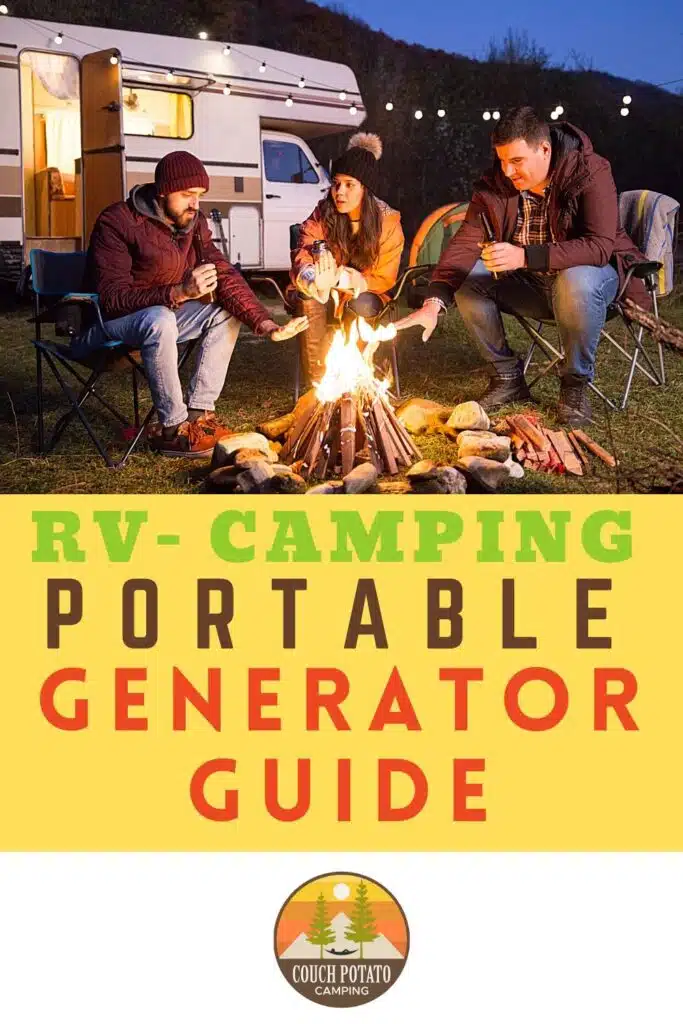We’ve compiled a portable power generating guide for RVers and campers who plan to camp off the grid or boon dock and would like to have access to a portable power source at your campground site.
Difference Between Portable Inverter Generators and Portable Power Stations
There are a few differentiating factors between portable inverter generators and portable power stations. As with any purpose bought equipment, it gets down to intended use and frequency of use. The same holds true for portable inverter generators versus portable power stations. For this discussion, we assume that your RV or camping equipment setup does not have an onboard power generator or power generating device – such as a solar power generating and storage system.
At a high level, the main differences between a portable inverter generator and a portable power station are:
- Sustained Output – measured in Watts – of the devices
- Continued time of usage – how long they can provide power prior to being recharged or refueled.
- Size and weight constraints of the device versus its intended use and location of use.
- Noise constraints of your RV or Campground site.
- Fuel source to recharge your power generating device
Reasons To Purchase a Portable Inverter Generator
- Your camping or RV equipment requires more than 1000 Watts to power when you’re off the grid or boon docking.
- You want to live large and power your RV or camping equipment’s air conditioner and other electronic devices at the same time.
- You want to use your portable inverter generator for RVing, camping, and home/residential use.
- You are looking for a portable power generating device that can run for several hours and potentially days without any recharging or refueling.
- You want the reliability of a higher wattage power generating device utilizing either gasoline or propane as a fuel source.
Reasons to Purchase a Portable Power Station
- Your intended use is to only power small personal electronic devices and top off your RV or camping equipment’s batteries.
- You do not want the hassle of dealing with a fuel source such as gasoline or propane.
- You want a smaller and more quiet device to serve as your off the grid and boon docking power needs.
- You want a power source that can be recharged via solar panel means, AC and DC power sources.
- You have weight requirements during your RV or camping outings that prohibit a more heavy gas or propane powered device.
Portable Inverter Generators for RV’s
As with all RV equipment related items, we remind you to consider your specific RV’s power requirements prior to purchasing a portable inverter generator. There are many variables regarding your specific RV’s power (measured in Watts) consumption and how you intend to utilize your RV’s generator that will help you determine the right size portable inverter generator.
Take the following factors into consideration when sizing your generator:
- Intended frequency and use for a portable inverter generator. Do you plan to boon dock 80%+ of the time or do you plan to stay at RV sites and campgrounds 50%+/- of the time. How often will you need to power your RV solely from a generator?
- Does your RV a 30Amp or 50Amp service?
- What is the maximum amount of wattage your RV can safely consume?
- Do you plan on running your RV’s air conditioner off the generator? The size (in Btu’s) of your RV’s air conditioner (11K Btu’s vs 13.5K Btu’s) will make a difference in sizing your generator.
- Are you merely planning on topping off your RV’s batteries and personal electronic device batteries when you camp off the grid or boon dock? If you do not plan on using your RV’s power hogging devices – such as the air conditioner, microwave, hair dryers, etc. – you may want to consider a lower wattage inverter generator.
Champion Gasoline Inverter Generator

✅ We recommend the Champion 3400 Watt CARB Gasoline Inverter Generator with Wireless Remote. We have personally had a Champion inverter generator for several years that served both our RV needs and personal residential needs for the following reasons:
- Cost: The Champion 3400’s price range will not drain your wallet like some of the higher end options such as the Hondas or Yamahas. This generator is a great option if you plan to RV with a mix of full/partial hookup sites and some off the grid/boon docking sites.
- RV Equipped Power Connection: Unlike similar options from other brands, this Champion model comes equipped with a built-in 30Amp RV power connection. You will not need to purchase any additional power converters to power your 30Amp RV as other brands may require.
- Operating Noise Level: The Champion inverter generators are not the most quiet in their class, however they rank second in several tests and comparisons to similar Honda and Yamaha generators. With the included ‘Eco’ operating mode this Champion model can operate even quieter than their normal operating noise output. Be mindful that many RV parks and National and State run RV campgrounds have limited and specific timeframes as to when you can run a portable generator – times may vary so validate prior to booking your site.
- Electric (Remote) Starter: An electric remote starter is a great way to save your rotator cups by not having to hand crank or over choke your generator.
- Size/Dimensions: Not all inverter generators are the same size. Some are taller than others. If you’re like us we stored our Champion generator in the bed of our truck. Since our truck has a lockable tonneau cover the dimensions of our generator was important. We wanted to maintain the weather protection and security of tonneau cover while being able to store our generator.
- Weight and Wheels: A 3400+/- Watt generator, depending on the brand, can be too heavy for one person to wield around. Our generator is right at 100 pounds with wheels and handles for ease of use. Similar wattage generators from other companies can reach into the 150+/- pounds range – too much weight for one adult to safely handle.

Portable Power Stations
Similar to portable inverter generators, there are several variables regarding your specific RV’s or camping equipment’s (i.e. pop up camper, tear drop camper or trailer, tent camping, etc.) power consumption requirements and intended use of our portable power station.
Take the following factors into consideration when sizing your portable power station:
- Intended frequency and use for a portable power station. Do you plan to boon dock 90%+ of the time at RV sites and campgrounds. How often will you need to power your equipment and devices? For example will you only need power at night to feed site lights and small cooking equipment and in the daytime to recharge camera batteries or other small personal electronic devices?
- Does your RV or camping equipment require a max 15/20Amp service?
- Are you looking for a portable power solution that is not heavy and does not take up a lot of space?
- Do you plan on running your devices for long periods of time? Factor in and consider the time your portable power station will take to recharge – either via AC outlet, DC (12v) plug or DC Solar Panel connectivity.
- Are you merely planning on topping off your RV’s batteries and personal electronic device batteries when you camp off the grid or boon dock? If you do not plan on using your RV’s air conditioner, microwave, hair dryers, etc. – you may want to consider a portable power station.
Jackery Portable Power Station

✅ We personally own and recommend the Jackery Portable Power Station Explorer 1000 with the Jackery (2) optional SolarSaga 100 solar panels.
- Cost: The Jackery Portable Power Station Explorer price range will vary depending on the max power output/wattage device you purchase. Jackery has several wattage options such as the 240Wh, the 518Wh, 1002Wh and 2160Wh devices. Jackery also has two options for their solar panels the 60W panel and the 100W panel
- Power Connections: Unlike portable inverter generators that can support a 30Amp connection, most portable power stations – depending on the brand – have a mixture of 110V power outlets, 12V power plugs, and USB connections. The quantity of each of these types of power connections will vary depending on the max watt-hours (Wh) your power station can provide.
- Operating Noise Level: The beauty of portable power stations is the lack of intrusive noise when compared to a gas or propane fueled inverter generator, since portable power stations utilize lithium battery technology. Depending on the model and type of portable power station you purchase, you may hear a slight fan noise (similar to a computer’s fan) when in use.
- Size/Dimensions: Similar to portable inverter generators; not all portable power stations are the same size. Some are taller and wider depending on the brand. In general, however, portable power stations are compact, reliable power sources to serve your RV and camping power requirements.
- Weight: The weight of your portable power station will vary again based on the watt-hours (Wh) your station can produce. The weight of a 1000Wh power station will be more than say a 240Wh power station. Regardless, most portable power stations are easily transportable by one adult.

✅ Check out our other articles on camping and RV equipment gear!

